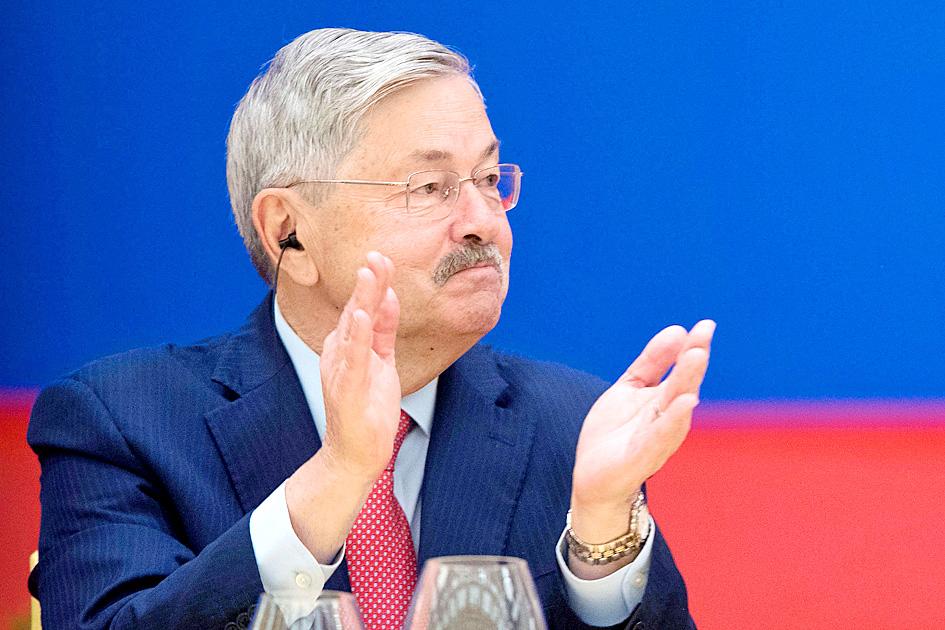US Ambassador to China Terry Branstad is to step down early next month, ending a three-year tenure marked by a trade war and increasingly bitter relations between the world’s two largest economies.
Branstad, appointed by US President Donald Trump in 2017, confirmed his decision in a phone call with Trump last week, the US embassy said in a statement yesterday. It did not give a reason for his departure.
“I am proudest of our work in getting the phase one trade deal and delivering tangible results for our communities back home,” he was quoted as saying at an embassy staff meeting yesterday.

Photo: AFP
Word of his departure leaked out earlier in the day when US Secretary of State Mike Pompeo thanked Branstad on Twitter for his service.
“Ambassador Branstad has contributed to rebalancing US-China relations so that it is results-oriented, reciprocal, and fair,” Pompeo wrote in a follow-up tweet.
The Chinese Ministry of Foreign Affairs said before the embassy announcement that it was aware of Pompeo’s tweet, but had not received any notification that Branstad was leaving.
Branstad became embroiled in a recent controversy when China’s official People’s Daily newspaper rejected an opinion column that he had written.
Pompeo last week tweeted that the Chinese Communist Party (CCP) refused to run Branstad’s op-ed while the Chinese ambassador to the US “is free to publish in any US media outlet.”
Chinese Ministry of Foreign Affairs spokesman Zhao Lijian (趙立堅) responded that Branstad’s article was “full of loopholes, seriously inconsistent with facts and wantonly attacks and smears China.”
The US embassy on Aug. 26 contacted the People’s Daily about the piece, asking that it be printed in full without any edits before Sept. 4, the People’s Daily said in a statement posted online.
Branstad, 73, is a native of Iowa and was governor of the major farming state for 22 years over two spans, from 1983 to 1999 and 2011 to 2017.
In 1985, he met Chinese President Xi Jinping (習近平), then a county-level CCP official visiting Iowa on a trade trip.
Soon after arriving in Beijing in June 2017, Branstad welcomed US beef back to the Chinese market after a 14-year ban, saying: “I know it is a key priority of the president to reduce the trade deficit, and this is one of the ways we can do it.”
However, trade relations quickly soured, as the US imposed tariffs on Chinese products and China retaliated in kind. Other disputes followed over technology, human rights and the response to the COVID-19 pandemic.
Branstad joined US Trade Representative Robert Lighthizer and US Treasury Secretary Steven Mnuchin at trade talks with Chinese counterparts in Beijing in May last year.
The “phase one” deal reached the following January represented a truce, but did not address the more fundamental complaints of the US side.

Tropical Storm Usagi strengthened to a typhoon yesterday morning and remains on track to brush past southeastern Taiwan from tomorrow to Sunday, the Central Weather Administration (CWA) said yesterday. As of 2pm yesterday, the storm was approximately 950km east-southeast of Oluanpi (鵝鑾鼻), Taiwan proper’s southernmost point, the CWA said. It is expected to enter the Bashi Channel and then turn north, moving into waters southeast of Taiwan, it said. The agency said it could issue a sea warning in the early hours of today and a land warning in the afternoon. As of 2pm yesterday, the storm was moving at

DISCONTENT: The CCP finds positive content about the lives of the Chinese living in Taiwan threatening, as such video could upset people in China, an expert said Chinese spouses of Taiwanese who make videos about their lives in Taiwan have been facing online threats from people in China, a source said yesterday. Some young Chinese spouses of Taiwanese make videos about their lives in Taiwan, often speaking favorably about their living conditions in the nation compared with those in China, the source said. However, the videos have caught the attention of Chinese officials, causing the spouses to come under attack by Beijing’s cyberarmy, they said. “People have been messing with the YouTube channels of these Chinese spouses and have been harassing their family members back in China,”

UPDATED FORECAST: The warning covered areas of Pingtung County and Hengchun Peninsula, while a sea warning covering the southern Taiwan Strait was amended The Central Weather Administration (CWA) at 5:30pm yesterday issued a land warning for Typhoon Usagi as the storm approached Taiwan from the south after passing over the Philippines. As of 5pm, Usagi was 420km south-southeast of Oluanpi (鵝鑾鼻), Taiwan proper’s southernmost tip, with an average radius of 150km, the CWA said. The land warning covered areas of Pingtung County and the Hengchun Peninsula (恆春), and came with an amended sea warning, updating a warning issued yesterday morning to cover the southern part of the Taiwan Strait. No local governments had announced any class or office closures as of press time last night. The typhoon

The Central Weather Administration (CWA) yesterday said there are four weather systems in the western Pacific, with one likely to strengthen into a tropical storm and pose a threat to Taiwan. The nascent tropical storm would be named Usagi and would be the fourth storm in the western Pacific at the moment, along with Typhoon Yinxing and tropical storms Toraji and Manyi, the CWA said. It would be the first time that four tropical cyclones exist simultaneously in November, it added. Records from the meteorology agency showed that three tropical cyclones existed concurrently in January in 1968, 1991 and 1992.